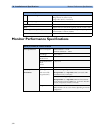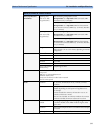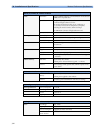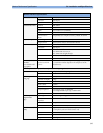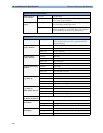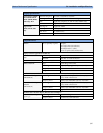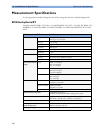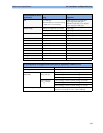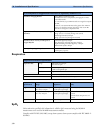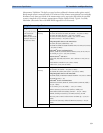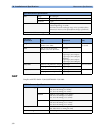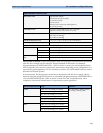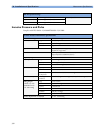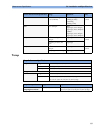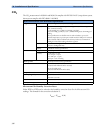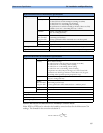
34 Installation and Specifications Measurement Specifications
350
Respiration
SpO
2
Unless otherwise specified, this information is valid for SpO
2
measured using the M3001A
measurement server and the M1020B measurement module.
Complies with EN ISO 9919:2005 (except alarm system; alarm system complies with IEC 60601-2-
49:2001).
Heart Rate Averaging Method Three different methods are used:
Normally, heart rate is computed by averaging the 12 most
recent RR intervals.
For runs of PVCs, up to 8 RR intervals are averaged to compute
the HR.
If each of 3 consecutive RR intervals is greater than 1200 ms
(that is, rate less than 50 bpm), then the 4 most recent RR
intervals are averaged to compute the HR.
Response Time of Heart Rate Meter to Change in
Heart Rate
HR change from 80 to 120 bpm:
Range: [6.4 to 7.2 seconds] Average: 6.8 seconds
HR change from 80 to 40 bpm:
Range: [5.6 to 6.4 sec] Average: 6.0 seconds
Heart Rate Meter Accuracy and Response to
Irregular Rhythm
Ventricular bigeminy: 80 bpm
Slow alternating ventricular bigeminy: 60 bpm
Rapid alternating ventricular bigeminy: 120 bpm
Bidirectional systoles: 90 bpm
Accuracy of Input Signal Reproduction Methods A and D were used to establish overall system error
and frequency response.
ECG/Arrhythmia/ST Supplemental Information as required by AAMI EC11/13
Respiration Performance Specifications
Respiration Rate Range Adult/pedi: 0 to 120 rpm
Neo: 0 to 170 rpm
Accuracy
at 0 to 120 rpm ±1 rpm
at 120 to 170 rpm ±2 rpm
Resolution
1 rpm
Bandwidth 0.3 to 2.5Hz (–6dB)
Noise Less than 25mΩ (rms) referred to the input
Respiration Alarm
Specifications
Range Adjustment Delay
High Adult/pedi: 10 to 100 rpm
Neo: 30 to 150 rpm
under 20 rpm: 1 rpm steps
over 20 rpm: 5 rpm steps
max. 14 seconds
Low Adult/pedi: 0 to 95 rpm
Neo: 0 to 145 rpm
under 20 rpm: 1 rpm steps
over 20 rpm: 5 rpm steps
for limits from 0 to 20 rpm: max. 4
seconds
for limits above 20 rpm: max. 14
seconds
Apnea Alarm 10 to 40 seconds 5 second steps



